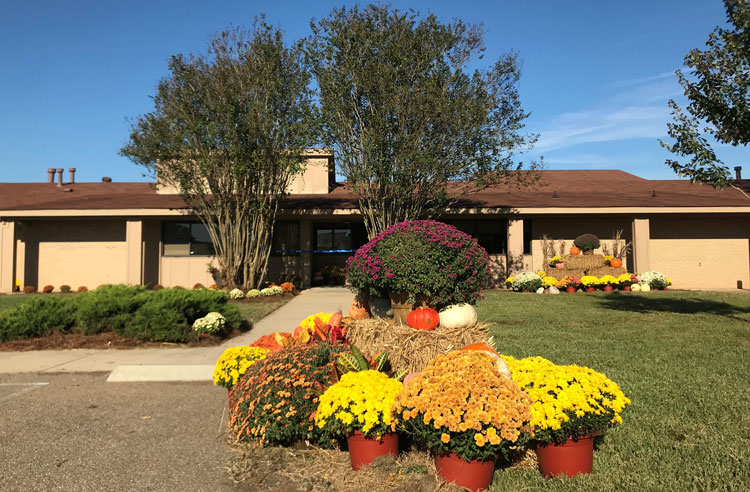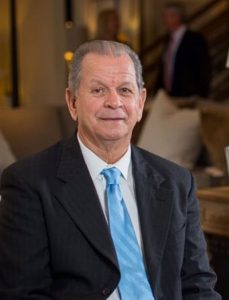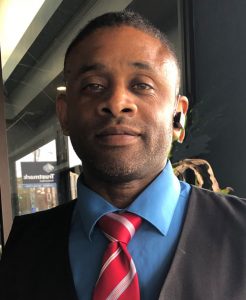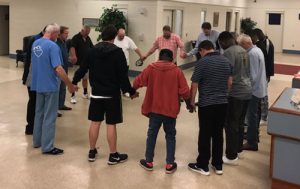By Katie Eubanks
M.O.R.E. than a second chance

Oak Cottage is located south of Raymond and will house 20 men returning from prison.
When Omar Travis was released from prison, his former employer offered him his job back.
His family surrounded him with support. He was able to live with his mother while he got on his feet.
Omar Travis is the exception.
“There’s a lot of men that get out (of prison) and they’ve burned a lot of bridges in their life,” said Travis, a resident manager at the Mississippi Offender Reentry Program (M.O.R.E.), which offers housing, work, mentorship and training for returning citizens.

“I never dreamed of doing
anything like this,” said Dr.
Gene Henderson, president of M.O.R.E.
Dr. Gene Henderson, a longtime Baptist pastor, is president and executive director of M.O.R.E., which started taking residents at a home near Raymond last fall. The goal, Henderson said, is not just to help men regain their lives, but to lead them to eternal life.
“They don’t have to be a follower of Christ, though we’ll do everything we can to lead them to Christ. We know it’s only through Christ that they can avoid the temptations to offend again,” Henderson said.
Last year, Henderson learned that “there are about 300 inmates paroled every month (in Mississippi), and many can’t get out because they have no listed address,” he said.
A Mississippi Parole Board member asked Henderson if he had a farm or a big house in the country where some former inmates could live.
“I said, ‘No, but if God wants me to do this, He’ll provide one.’”
God provided not only housing but also jobs, training and mentorships for returning citizens.
Henderson and others found a suitable house with the help of Families First For Mississippi.
Oak Cottage used to be part of the Oakley Youth Development Center south of Raymond, and is anything but a cottage: The home measures 8,000 square feet, contains 16 full bedrooms and will house 20 men.
At press time, 11 returning citizens were living at Oak Cottage, along with one resident manager and one assistant resident manager at all times.
Returning citizens work at Premier Services, which provides banking and technological services for inmates; the DG Foods poultry plant in Gallman; and industrial companies that have agreements with TempStaff Industrial.
On a typical day, managers drop the men off at work at 6 a.m., and they work till 2:30 or 3 p.m. One resident is a talented cook, so he makes dinner. Most nights of the week, the men participate in some kind of training or Bible study. The five pillars of M.O.R.E. are education, life skills, recovery, spiritual guidance and financial management, and the instruction at Oak Cottage covers all five.
(The M.O.R.E. name — and more importantly, the instructional model — is based on the Texas Offender Reentry Initiative, or T.O.R.I., which has seen huge success, Henderson said.)
Bedtime at Oak Cottage is generally 9 p.m. Returning citizens are off work on Saturdays, and on Sundays, they attend church — usually Pinelake Clinton, where Travis attends.
In April, M.O.R.E. hopes to start allowing family visits two Saturdays a month at Oak Cottage – on a very limited, case-by-case basis, said Bobby Brister, M.O.R.E.’s chief operating officer.
But the key component of M.O.R.E. is mentorship, Brister said. The organization pairs a mentor with each returning citizen, starting six to eight weeks before his release from prison and running for the duration of his stay at the home.
“The mentor program is our silver bullet. If you can get with a Christian mentor for six months … The most positive feedback from our residents is about their mentors. One resident said, ‘I feel like my mentor is the only person who cares about me.’”
‘Have you hit the bottom?’
Because Oak Cottage is so close to the Oakley youth facility, M.O.R.E. cannot accept sex offenders or men convicted of violent crimes. And M.O.R.E. only takes those who have nowhere else to go upon release.
A team of four men interviews each prospective resident, either in person or over the phone depending on where they are geographically, Henderson said.
“We ask them, ‘Are you ready to change your life? Have you hit the bottom?’”
Dr. Ron Mumbower, a psychologist and former head of Summit Counseling at First Baptist Jackson, receives a copy of each returning citizen’s interview questions and answers in order to evaluate his greatest instructional needs — such as anger management, which comes up a lot. Most of the men also have a history with drugs.
Sprouting wings
Life at Oak Cottage is challenging, said Travis, who is usually there for five or six days and off for three or four. Even on off days, though, he maintains communication with the returning citizens, their parole officer and work supervisors, and his own coworkers. He’s also vice president of facilities and maintenance.

Omar Travis works both for M.O.R.E. and at Surin of Thailand in Jackson.
“Sometimes I find myself a little bit drained,” Travis said. He often meets others’ needs at the expense of his own, and is still learning how to balance the two.
But he’s already seeing the rewards.
“There’s one gentleman — this gentleman does not know how to read or write,” Travis said. “He’s probably about 46 or 47 years old. So one of the problems that he’s had is, he’s never really picked up the Bible and read it. So one of his mentors went out and got him the Bible on tape.
“And this man has been listening to that each and every day. And each and every day, he comes to me with some type of question about what’s going on in the Bible. And I’m just seeing this man sprout. It’s like he’s sprouting wings. When he came to the program, he was very closed off. He was very skeptical.”
When men arrive at Oak Cottage, Travis does devotionals with them and helps familiarize them with the house and rules. Throughout their stay, he’ll take them to appointments to get their driver’s license, social security card, birth certificate and other documents they might be missing. His experience in prison helps them trust him, he said.
“There’s trauma that’s involved inside a prison. … They know that I’ve been there. (And) they can’t run nothing over on me.”
“Another thing I try to do is, I have a background in Bible college and seminary, and I try to help them to go and look at their situation in a biblical view instead of looking at it as a victim. (That) helps us become more accountable and it helps us take responsibility for our actions.”
Speaking of personal responsibility, many returning citizens say, “I’m not looking for a handout.” Which sounds great, right?
But what that translates to is, “I don’t want or need your help. I can do it myself.”
“Really that’s a pride position,” Travis said.
“(Our very first resident) came out (of prison) with that attitude. (But) as his mentor and the church began to come alongside him, he realized he needed this help. I won’t say handouts, but they need hands up.”
Picking up steam
Right now M.O.R.E. serves men between 20 and 50 years old, partly because their work involves manual labor. And only men who have nowhere else to go are eligible, Henderson said.
“We have asked the question, is it possible for us to provide employment for people who are staying somewhere else? We don’t know yet.”
Oak Cottage is barely halfway full. But the intake process – which involves a lot of coordination with the Mississippi Department of Corrections (MDOC) – has picked up steam and “we’re getting a lot more names to deal with now,” Henderson said.

Returning citizens and their mentors pray together.
M.O.R.E. has developed a good working relationship with MDOC — especially with Christy Gutherz, the agency’s deputy commissioner of reentry.
“She has been a super person to work with. She has bent over backwards to help us. She was able to dedicate a parole officer to our building, Angela Harper, so they all report to the same parole officer. (Angela is) a champ, too. She really has a heart to help these people.”
Five other cottages sit on the property near Oakley, and M.O.R.E. will be able to access all six as renovations are finished. That’ll mean 120 beds, with some of the costs defrayed by MDOC.
M.O.R.E. also hopes to serve people under 20 and over 50 in the future, along with women.
“We have a plan for females in Magee, at their community work center. We will lease it and renovate it to accommodate up to 20 females.”
But for now, “we’re trying to focus on what we’re doing right now and get established.”
M.O.R.E. is a 501(c)(3) and donations are tax deductible. The organization is also seeking African-American mentors for returning citizens. For more information, visit morems.org